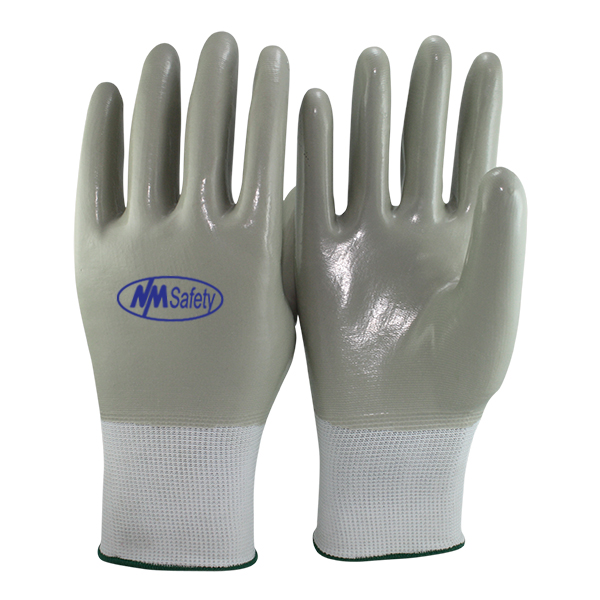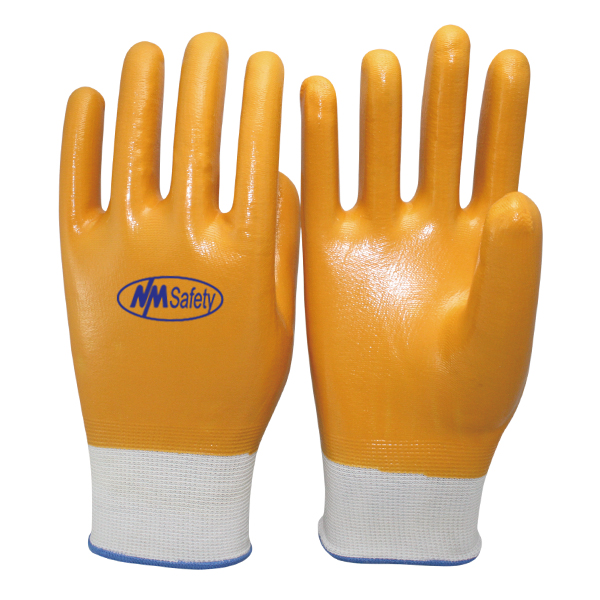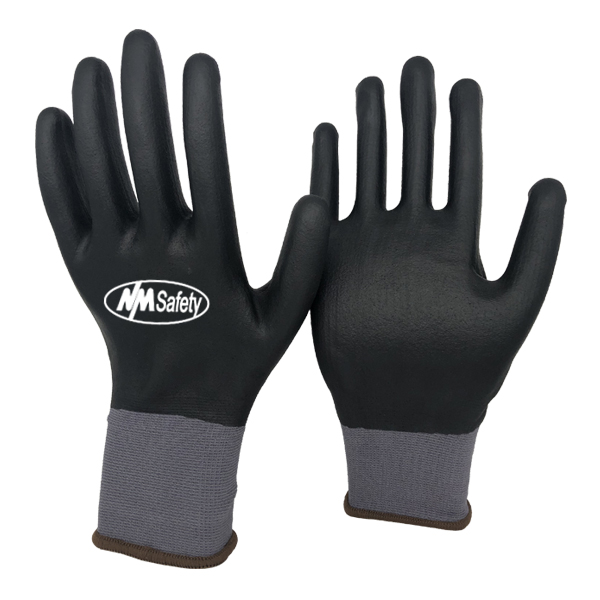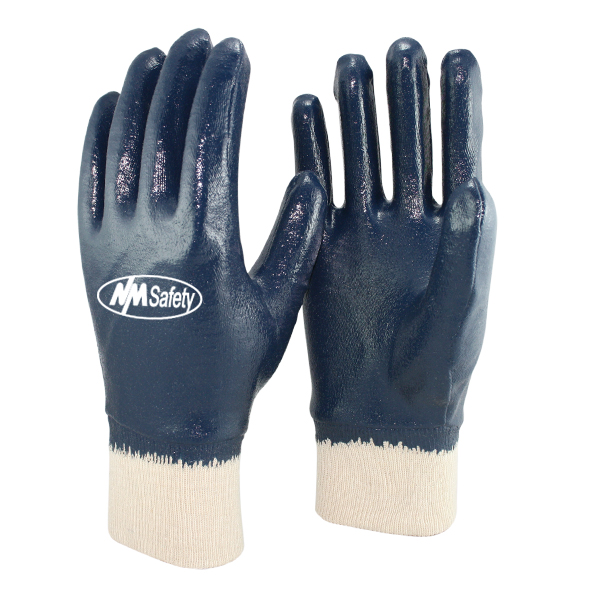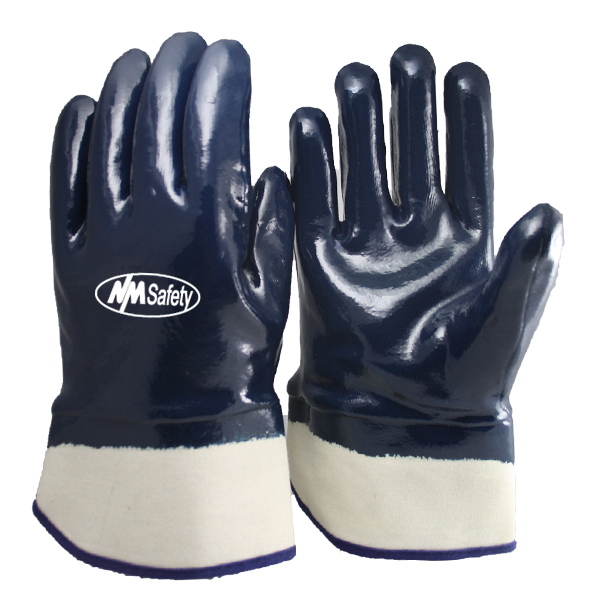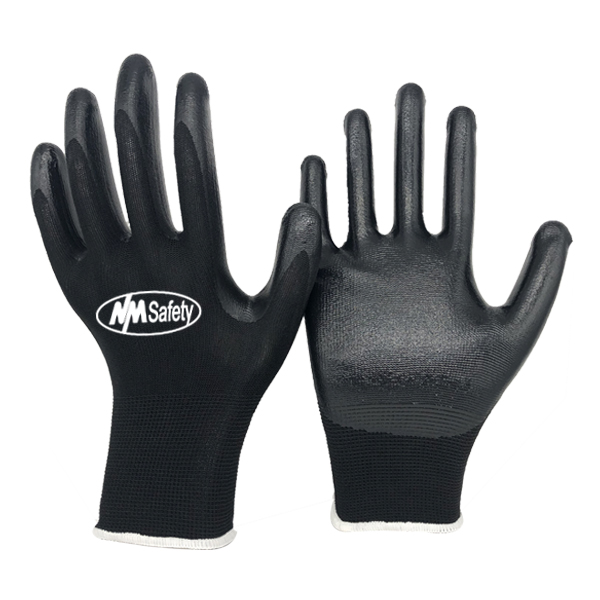What are Nitrile Coated Gloves?
Nitrile is a highly flexible glove material that provides excellent grip and protection against many risks. Nitrile Coated Gloves are suitable for many industries and applications, including construction, handling, and chemical resistance, guaranteeing that your hands are well supported and protected.
Construction and automotive industries, box handling, and many other fields benefit from nitrile-coated gloves. These are a cost-effective alternative to leather/leather palm gloves. While it lacks the elasticity and grip of natural rubber, this synthetic latex is known for its strength. Nitrile-coated gloves are up to three times more puncture resistant than natural rubber latex-coated gloves.
Nitrile Coated Gloves Protect Against:
The wearer's hands are safe with nitrile gloves. The nitrile substance protects the wearer's hands from contamination and prevents them from contamination. From any item or surface, they come into contact. Nitrile is chemically resistant to many chemicals and substances, making it waterproof, greaseproof, and oil-proof. Because of their excellent puncture resistance and dexterous strength, nitrile flex glove is also extensively utilized in the medical profession.
Nitrile gloves, in particular, offer adequate protection against the following chemicals:
- Acetone
- Ethanol
- Isobutyl
- Isopropyl
- Methanol
Recyclable:
In many nations, nitrile-coated gloves are recyclable. It is possible to recycle nitrile gloves. They must, however, be placed in a specific separate recycling bin rather than in your regular recycling bin. The Glove Company is devoted to ensuring that everyone's hands, the beautiful planet we call home, are protected. That is why we are delighted to present this to you.
Types Of Gloves:
Rescue Gloves:
Rescue gloves are for a variety of tasks during stressful events. Police, fire, and search and rescue personnel wears them to provide puncture resistance, cold-weather insulation, improved grip and sensitivity, and reflectivity in emergencies. Although they may be fire/heat resistant, they are not ideal for firefighting.
Sandblasting gloves:
Sandblasting Gloves protect the user's hands and arms from overspray when using abrasive blasting procedures. They have long cuffs with a material that is alkali and acid resistant while also giving extra grip.
Tactical Gloves:
When police, military, and security personnel are engaged in aggressive or hostile operations, tactical gloves provide the best grip, puncture resistance, contamination control, and digit articulation. Many of the designs do not require the use of fingers.
What are Smooth Nitrile Full Coated gloves?
Punctures, wounds, snags, abrasions, lubricants, and fuels are resistant to Nitrile Foam coated gloves. They're single-use gloves composed of synthetic rubber. Unlike natural rubber, this product is made entirely of synthetic materials and does not cause allergic reactions.
Advantages:
Smooth nitrile full-coated gloves provide a good blend of warmth and protection for warehouse employees. Workers will be safe from the cold, oils, and hazardous chemicals. These gloves have an enhanced grip that makes handling precision equipment simple.
The Nitrile covering is impervious to oil and other petroleum-based compounds. Furthermore, the nitrile barrier protects your skin by preventing dangerous chemicals from penetrating. These gloves do not quickly break down and can be cleaned in cold water and allowed to dry so that they might use again and again.
Easier to put on and take off: Nitrile rubber gloves have a lower friction resistance than natural rubber latex gloves, making them easier to put on and take off. Finishes to smooth nitrile flex gloves provided throughout the production process for easier putting on and removing disposable gloves.
Benefits:
Before getting into the specifics of what smooth nitrile full coated gloves protect against, it's crucial to understand the difference between incidental and extended contact.
To distinguish between incidental and extended contact scenarios, use the following definitions:
Incidental contact:
Situations that require barrier protection include random splashes or spills, unintentional overspray from dispensing equipment, and dealing with infectious pathogens.
Extended contact:
Long-term exposure scenarios include coming into contact with highly contaminated materials, submerging hands in a chemical or other hazardous substance, being exposed to extreme temperatures, and handling sharp or piercing objects.
Application:
- Electronics
- Handling Components
- Manufacturing and repair of automobiles
- Aeronautics
- Light Engineering Works
- Handling Components that are delicate and lubricated
- Automotive assembly
- Maintenance
- Mining and oil industries
- General work
- Metal industry
- Maintenance
- Construction
- Engineering
- Automotive Manufacturing Packaging, Plumbing, Assembly Industry
Smooth Nitrile Full Coated Gloves Protect Against:
These gloves, in particular, provide this reliable splash protection against the following substances:
Micro-Organisms:
Smooth nitrile full coated gloves protect against bacteria, fungus, and viruses. Nitrile rubber makes excellent surgical-grade medical gloves because of their consistent protection.
Oils, fuels, and petroleum products:
A nitrile grip glove protects the wearer's hands from potentially harmful petroleum compounds such as lubricants, fuels, greases, etc. These gloves are a popular choice for automotive, manufacturing, and industrial applications because of their high level of protection.
Weak acids:
Wearers of nitrile-coated gloves are safe from mild acids like sulfuric acid and nitric acid. Because of this resistance, nitrile gloves are helpful in many industries, from pharmaceuticals to food services.
Weak caustic:
Any material that has the potential to induce corrosion is termed caustic. Nitrile grip gloves can withstand mildly corrosive liquids.
Organic solvents:
Nitrile gloves are appropriate for use in laboratory work and other tests due to their resistance to several organic solvents.
Smooth Nitrile Or Latex for Mechanics gloves?
Latex gloves are weaker than smooth nitrile full-coated gloves. They're also more chemically resistant, have a stronger puncture resistance, and are available in trade-specific colors. Most mechanics require a glove that is robust and chemically resistant. Thus they opt for smooth Nitrile full coated Gloves.
Conclusion:
Smooth nitrile full coated gloves are preferred over many other gloves because they are more chemical resistant and less likely to rip when pierced. Furthermore, wearing nitrile-coated gloves protects against latex allergies. Wear a thicker glove, such as smooth nitrile full coated gloves, when working with poisonous compounds or substances that can absorb through the skin. NM Safety is the ideal option because it offers all of the above attributes at the best price.





